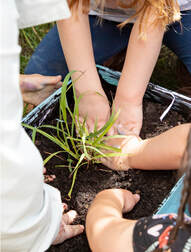|
By: Dawn Irwin Two summers ago, I enrolled in an amazing course offered through Shelburne Farms called Education for Sustainability. Not knowing very much about it, I thought I would be learning some new sustainability practices to help our school, students, and teachers become better stewards for the Earth. Come to find out, this course would rock my foundation and help me combine many facets of my educational philosophy into one incredible overarching theme.
As a Reggio Emilia inspired Early Educator, play and arts-based learning and collaboration between students, teachers, and the community with an emphasis on social/emotional learning and social justice have always been extremely important pieces of my pedagogical puzzle. It is imperative that children feel invested in the relationships and spaces they spend their time in. These concepts are key components to achieving this goal. What the course at Shelburne Farms taught me is that sustainable educational practices already include these crucial ideas under its umbrella. I no longer needed to think of these things as separate parts of my philosophy, it can all be seen through the single lens of Education for Sustainability. I was so excited to bring this back to Growing With Wonder and couldn’t wait to share the concept with the other teachers at school. We talked a lot about what I learned over inservice and decided to embrace these practices and bring them into the classroom with even more intention than we already were. One of the first opportunities we were given to put this theory into practice was with some tomato plants that were donated to our school. It was our first time trying to grow something with the kiddos and everyone was very excited about the process. That first attempt had a wonderfully sweet outcome that came straight from the kiddos. From there, our students decided they wanted to grow more edible plants during the next growing season. A curriculum thread we had been following for the full school year was storytelling. It started with the kiddos just listening to stories–some from books, some from read-alouds–and grew into the students creating their own elaborate stories, both through book making and oratory storytelling. During the winter, we began drinking tea during our storytelling events. So, when it came time to think about planting a new garden in the spring, the kiddos immediately latched on to the idea of creating our very own tea garden. By this time, Shelburne Farms had reached out to me to see how Growing With Wonder was applying the teachings from the Education for Sustainability course. When I told them about the tomato plants and the students’ tea garden idea, they asked if they could photograph us planting the tea garden. We immediately said yes! It was such an honor being able to show the folks at Shelburne Farms some of the ways in which we were able to implement Education for Sustainability almost immediately after the course ended. And, the class taught me how easily we can start to put together the building blocks of stewardship, advocacy, community, and equity through the simple act of planting just two tomato plants and watching the wonder grow within the eyes of our students. And, this is only the beginning. You can read more about our gardening adventures in an article written by Shelburne Farms, which you can find here: vermontfarmtoschool.org/sharing-very-hungry-caterpillar?fbclid=IwAR2paEGdChwQFrKcbFu-XeVENt_11fpZ4ycHB4WaZuKOBCJ9J445iw__BYI
1 Comment
Krista
10/23/2023 03:04:15 pm
I absolutely love this!!
Reply
Leave a Reply. |
AuthorsWe are Early Childhood Educators that consider introspection and reflection valuable tools that help us become the best teachers we can be. Please enjoy reading all about our adventures inside and outside of our classroom! Archives
November 2023
Categories |

 RSS Feed
RSS Feed
